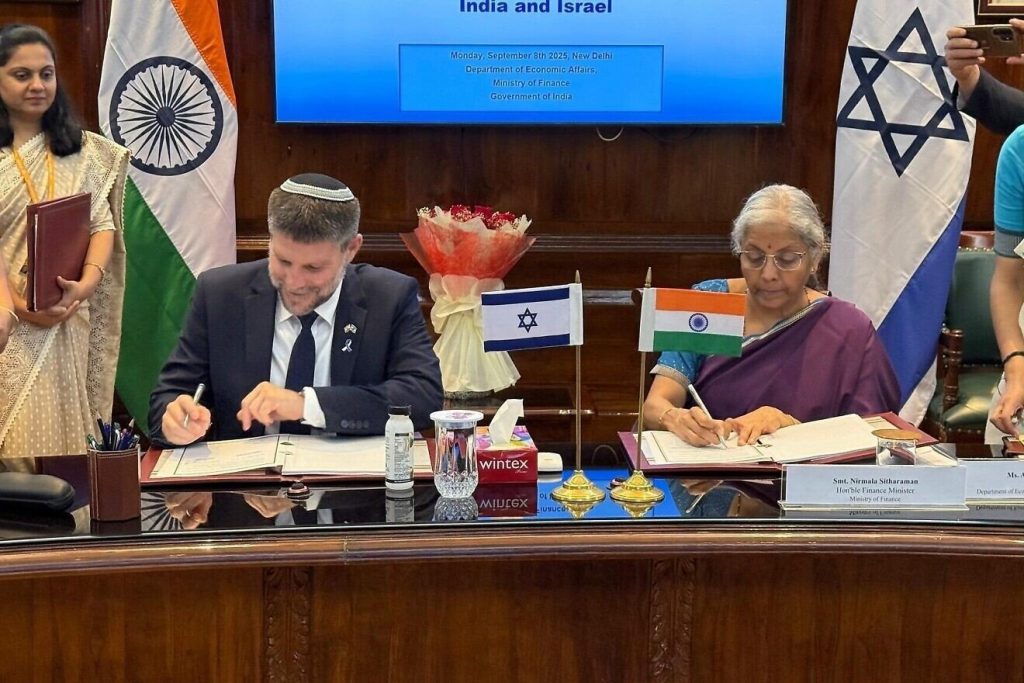As the first OECD member state to sign under India’s new treaty model, Israel’s partnership offers unique lessons for India’s broader strategy.
The signing of the Bilateral Investment Treaty (BIT) between India and Israel on Sept. 8, 2025, marks more than a diplomatic milestone as it represents a strategic inflection point in India’s approach to economic diversification and resilience-building.
As the first OECD member state to sign under India’s new treaty model, Israel’s partnership offers unique lessons for India’s broader strategy of balancing self-reliance with strategic interdependence.
In an era defined by global revolution, powers like India and Israel face complex choices. The reshaping of global supply chains, trade flows and technology standards demands that emerging economies avoid over-dependence on any single relationship.
India’s leadership has recognized that true self-reliance, as embodied in initiatives such as “Make in India,” requires complementary diversification strategies that enhance rather than compromise national resilience.
Here, promoting co-production and manufacturing collaboration could help India transition from low-margin production to high-value advanced technologies. Israeli experience in precision manufacturing, quality systems, and innovation processes could support India’s ambitions to become a global manufacturing hub for sophisticated products.
This strategic calculus is particularly relevant as geopolitical tensions persist in disrupting established economic patterns. Countries that have diversified their partnerships demonstrate greater stability when facing external shocks, while those with concentrated dependencies often find themselves vulnerable to sudden policy shifts by major powers.
While India-Israel defense cooperation has been a cornerstone of bilateral relations, the economic potential remains significantly underexplored. The United States provides an instructive model here.
Despite already dense bilateral ties across multiple sectors, American states continue investing in expanding cooperation with Israel; not from sentiment, but from demonstrated returns in job creation, economic diversification, and technological advancement.
Several U.S. governors have established dedicated offices solely to deepen ties with Israel, recognizing concrete benefits for their constituents. This pragmatic approach offers valuable lessons for both Indian states and the central government.
Agriculture presents perhaps the most compelling case for expanded cooperation. India possesses the world’s largest cattle population—approximately 307.5 million, making it the global leader in total milk production. However, productivity per animal remains suboptimal at about 1,777 kilograms annually, well below the global average of 2,699 kilograms.
This productivity gap stems from infrastructure deficits, limited access to modern technology, and inadequate disease management systems. Israel’s dairy sector, by contrast, achieves among the world’s highest yields through advanced breeding techniques, precision veterinary care and sophisticated agricultural technologies.
The opportunity is substantial. Even modest improvements in per-animal productivity could significantly enhance food security, boost rural incomes, and strengthen India’s agricultural export competitiveness. Israeli expertise in precision agriculture, water-efficient farming and livestock management could catalyze this transformation.
Beyond agriculture, several sectors offer immediate collaboration potential. In renewable energy, Israel’s advances in solar technology, energy storage and efficiency systems complement India’s ambitious green transition goals. As India scales up renewable capacity, Israeli innovations could accelerate deployment while reducing costs.
Cybersecurity represents another critical area. With India’s digital economy expanding rapidly, including the world’s largest fintech ecosystem, Israeli cybersecurity expertise becomes increasingly valuable. The growing sophistication of cyber threats requires cutting-edge defensive capabilities that Israel has developed through necessity and innovation, which could prove valuable for India, especially to safeguard against Chinese cyber bots.
Academic and research collaboration represents untapped potential. Student exchanges, joint research initiatives, and innovation partnerships could enhance India’s human capital while exposing young Indians to global best practices. Israel’s “startup nation” experience offers valuable insights for India’s entrepreneurial ecosystem, while India’s scale provides Israeli innovators with unprecedented market opportunities.
This symbiotic relationship could create innovation corridors linking Indian and Israeli research institutions, potentially spawning breakthrough technologies with global applications. Therefore, a win-win for both!
The broader strategic impact extends beyond specific sectoral gains. Diversified partnerships create multiple channels for economic opportunity, reducing vulnerability to external shocks and enhancing overall system resilience. This approach strengthens rather than dilutes existing relationships with traditional partners such as the United States, Europe and Asian neighbors.
Diversification is fundamentally about creating strategic options. In an unpredictable global environment, countries with multiple high-quality partnerships navigate challenges more effectively than those dependent on single relationships.
The BIT signing creates institutional frameworks for deeper engagement, but realising potential requires sustained commitment from both governments and the private sectors. India should consider establishing dedicated mechanisms to systematically expand cooperation across all promising sectors.
Furthermore, the Israeli announcement of potentially opening a Ministry of Finance representation office in India signals a serious commitment to this partnership. India should reciprocate with concrete initiatives that facilitate business-to-business connections and knowledge transfers. Who knows? We could see the makers of Iron Dome making the Sudarshan Chakra.
As India shapes its economic future in an era of technological transformation and geopolitical flux, the Israel partnership offers a model for strategic diversification that enhances both prosperity and resilience. The question is not whether to deepen this relationship, but how quickly India can capitalize on the opportunities it presents.
This article was originally published in JNS on September 14th, 2025. You can find that version here.
Cover photo: Finance Minister Bezalel Smotrich and his Indian counterpart Nirmala Sitharaman sign a bilateral investment agreement in New Delhi, Sept. 8, 2025. Credit: Israel Finance Ministry.

